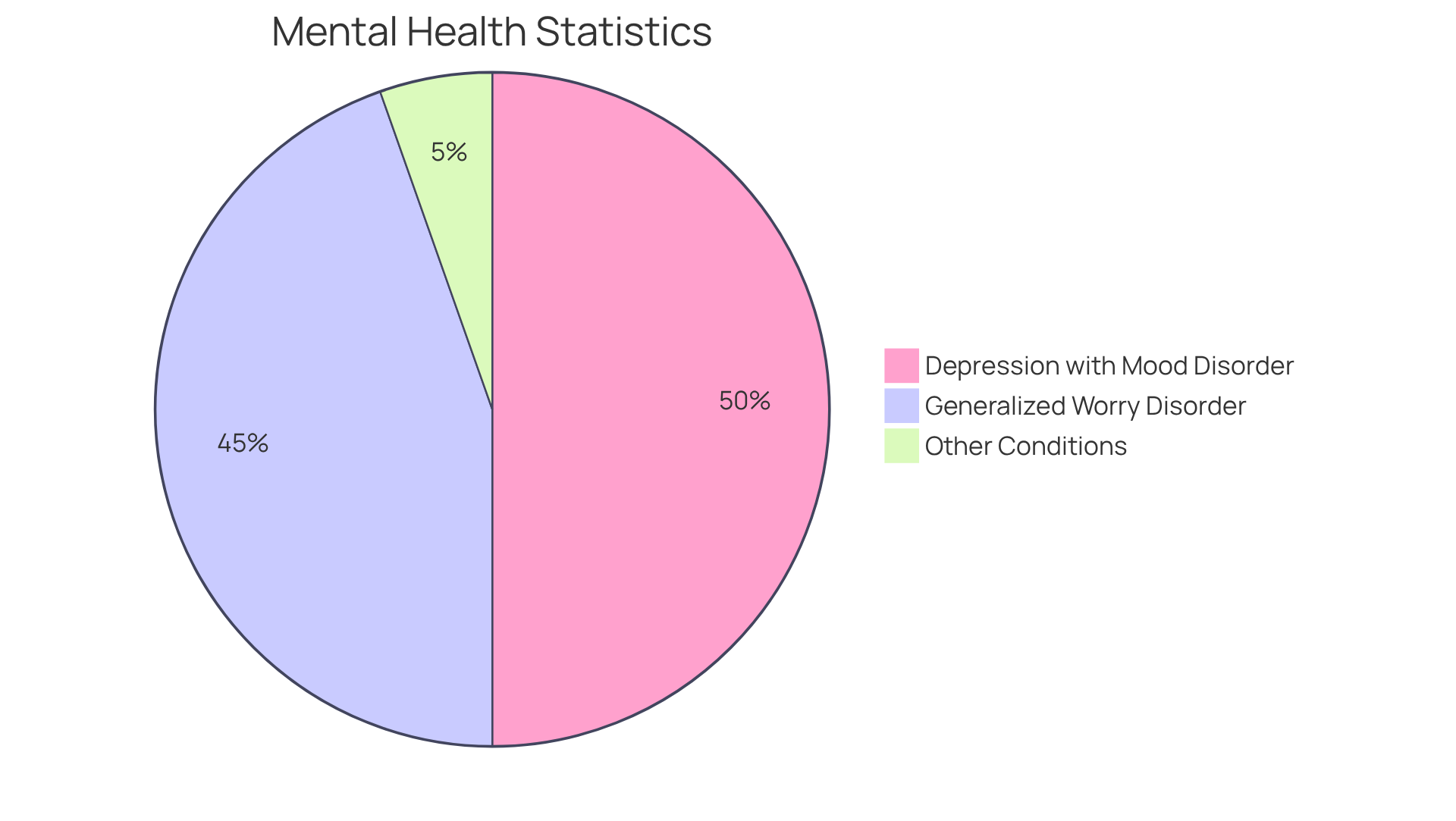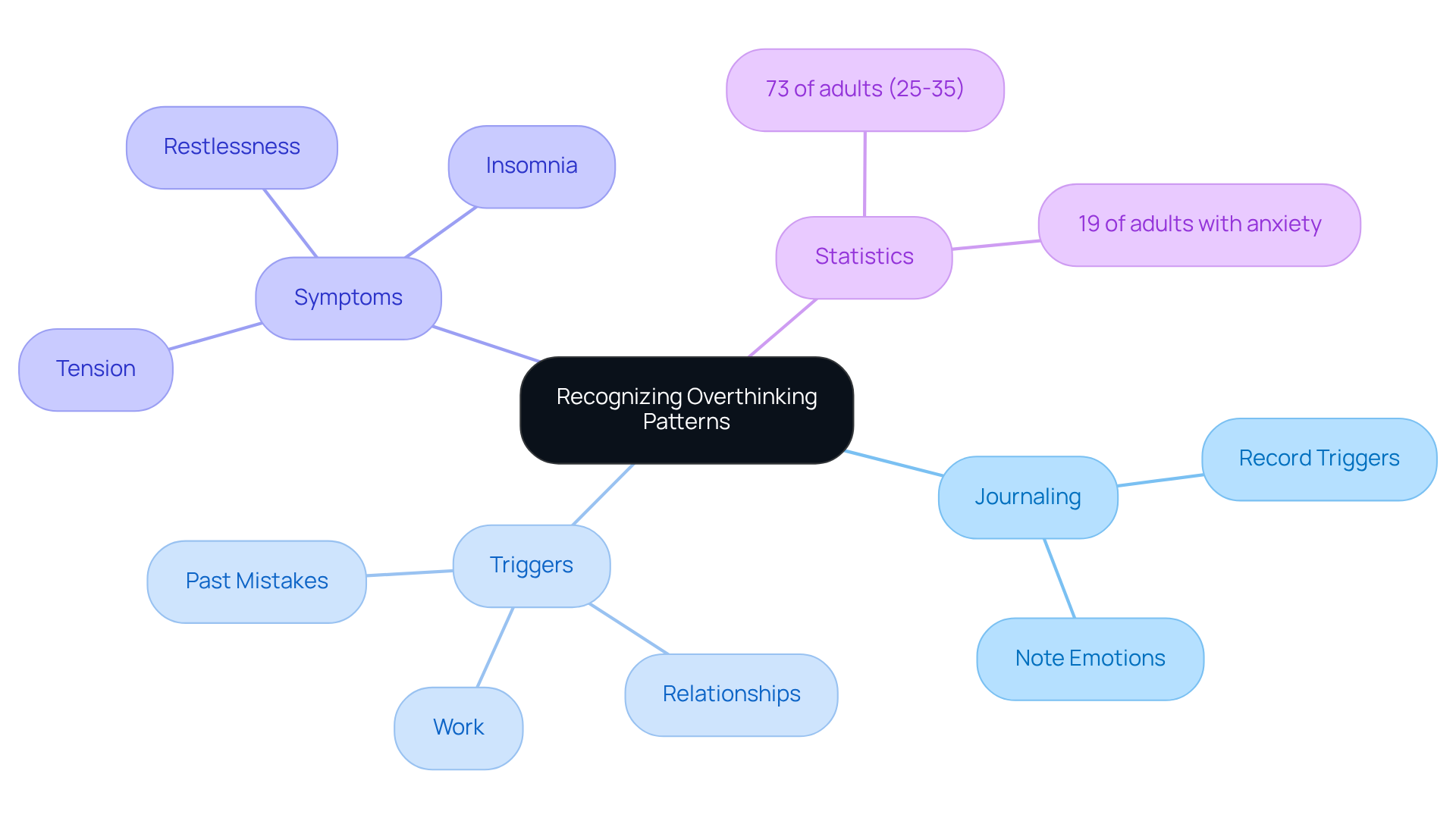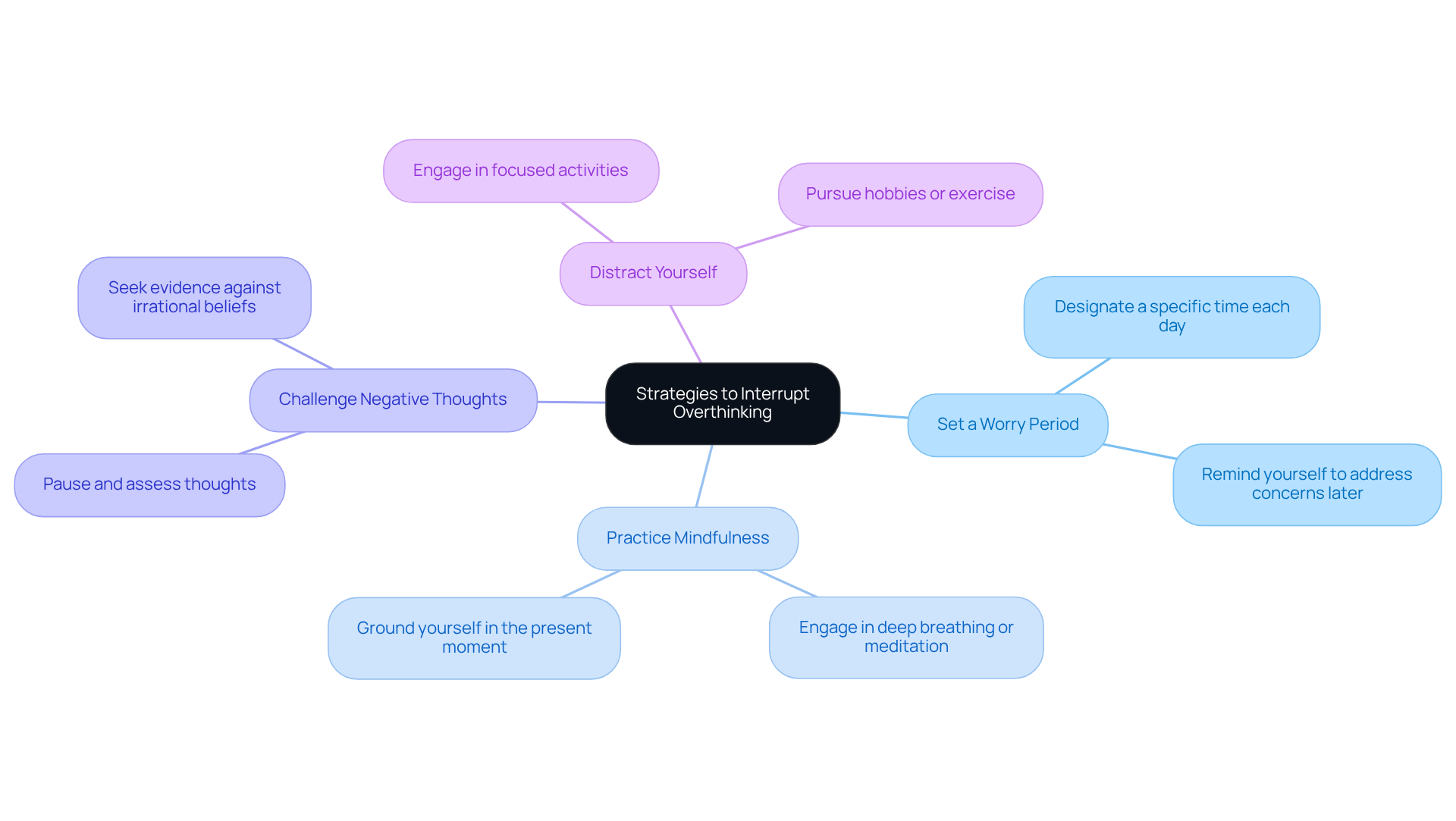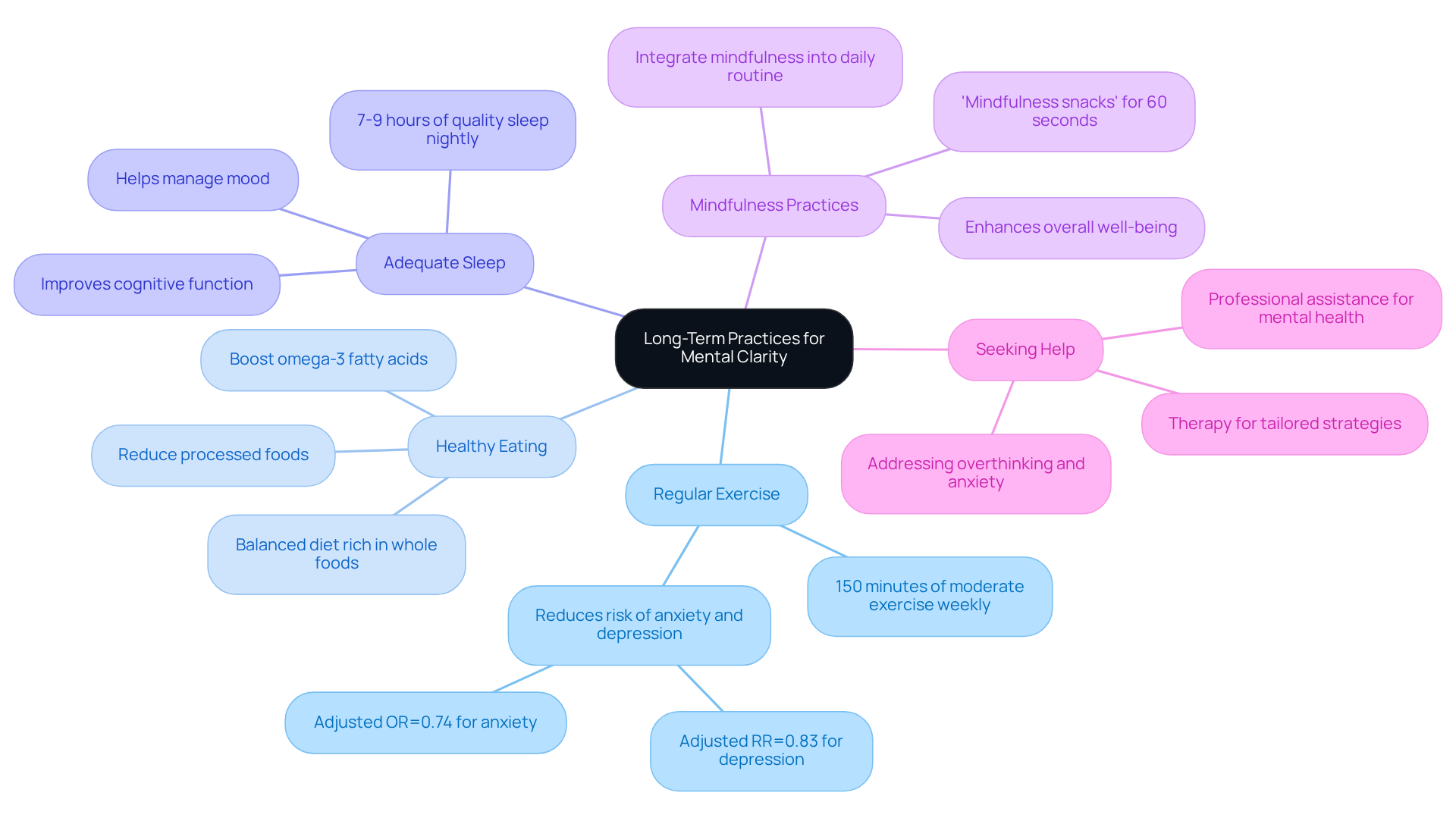Overview
This article highlights four compassionate steps to help you stop overthinking and ease anxiety.
- First, it’s important to recognize your overthinking patterns. Have you ever felt overwhelmed by your thoughts? Acknowledging these patterns is the first step toward finding clarity.
- Next, implementing strategies to interrupt these thoughts can be incredibly beneficial. Techniques such as mindfulness and exercise can serve as effective tools to disrupt the cycle of negativity.
- Moreover, establishing long-term practices for mental clarity is essential. These practices not only help in the moment but also contribute to your overall emotional well-being.
- Seeking professional help can be a crucial part of this journey. Remember, you are not alone in this; many people experience similar struggles.
The evidence surrounding the prevalence of overthinking and anxiety underscores the importance of these steps. By taking action, you can break free from the cycle of negative thinking. Embrace these strategies, and consider reaching out for support. Your journey toward emotional well-being is important, and every step you take is a step toward healing.
Introduction
Overthinking and anxiety often weave a complex web, entrapping individuals in cycles of distress and emotional exhaustion. Have you ever felt overwhelmed by the weight of your thoughts? Understanding how to break free from this mental struggle is essential. This article explores practical strategies to halt overthinking and alleviate anxiety, offering you the tools needed to reclaim your mental clarity and emotional well-being.
But what happens when the very act of worrying feels like a misguided attempt at control? As we explore this further, you'll find that there is hope and healing available to you.
Understand Overthinking and Anxiety
Overthinking can often feel like a heavy burden, as it involves excessively dwelling on thoughts, highlighting the need for strategies on how to stop overthinking and anxiety to alleviate stress. Have you ever found yourself ruminating on past events or worrying about what the future holds? This mental process intertwines closely with anxiety, which is characterized by feelings of unease, nervousness, or fear, highlighting the need to understand how to stop overthinking and anxiety. Together, they create a challenging cycle that can leave you emotionally exhausted and make it difficult to .
Statistics reveal that nearly half of individuals diagnosed with depression also experience a mood disorder, highlighting the deep interconnectedness of these conditions. Moreover, 44.6% of adults with generalized worry disorder face moderate impairment in their daily lives, illustrating the significant impact these mental health challenges can have. Real-world examples show how excessive contemplation can drain emotional energy, as many find themselves trapped in a loop of negative thoughts, leading to avoidance behaviors and social isolation.
Recognizing that excessive contemplation and anxiety are common experiences can provide insights on how to stop overthinking and anxiety. This understanding is a crucial first step toward promoting proactive measures for effective management and recovery, including how to stop overthinking and anxiety. If you or someone you know is struggling, remember that seeking support can be a powerful way to begin the healing journey. Together, we can work towards a brighter, more balanced future.

Recognize Your Overthinking Patterns
To effectively identify your excessive thought patterns, consider starting a journal. By recording moments when you find yourself lost in thought, you can note the specific triggers and the emotions they bring up. Have you ever felt overwhelmed by concerns about work, relationships, or past mistakes? Common themes may emerge as you reflect on these entries. Research shows that 73% of individuals aged 25 to 35 experience overthinking, highlighting how prevalent this issue is among adults.
In addition, pay attention to physical symptoms like tension, restlessness, or insomnia, which often accompany these thought patterns. Nearly 19% of adults in the U.S. are affected by anxiety disorders, which can worsen these symptoms. By systematically identifying your triggers and the contexts in which they arise, you can gain valuable insights into your rumination habits. This understanding can pave the way for more effective .
As Dr. Brenda Y. Camacho wisely notes, 'Worry promotes an illusion of control, wherein constantly thinking about a problem feels like a proactive measure.' This perspective emphasizes the importance of understanding how to stop overthinking and anxiety in order to regain mental clarity. Remember, you are not alone in this journey, and seeking support can lead you to a place of healing and peace.

Implement Strategies to Interrupt Overthinking
To interrupt overthinking, consider these supportive strategies:
- Set a Worry Period: Have you ever found yourself consumed by worries? Designate a specific time each day to focus on these thoughts. Outside of this period, gently remind yourself that you will address these concerns later, allowing your mind to rest in the present.
- Practice Mindfulness: Engaging in mindfulness exercises, such as deep breathing or meditation, can be a nurturing way to ground yourself in the present moment. This practice can help diminish the intensity of anxious feelings, creating space for calm.
- Challenge Negative Thoughts: When you notice yourself dwelling on worries, pause and ask whether your thoughts are based on facts or assumptions. By challenging any irrational beliefs and seeking evidence against them, you can foster a more compassionate perspective towards yourself.
- Distract Yourself: Sometimes, engaging in activities that require focus—like reading, exercising, or pursuing a hobby—can be a gentle way to redirect your mind away from overthinking. These moments of distraction can provide a refreshing break for your thoughts, especially when considering how to stop overthinking and anxiety.
As you explore these strategies, remember that seeking help is a sign of strength. You are not alone in this journey, and there are available to support you.

Establish Long-Term Practices for Mental Clarity
To establish long-term practices for mental clarity, consider the following:
- Regular Exercise: Have you ever noticed how a simple walk can lift your spirits? Participating in physical activity is a proven way to reduce stress and improve mood. Aim for at least 150 minutes of moderate exercise each week. Studies indicate that even low levels of physical activity can significantly reduce the risk of developing anxiety and depression. In fact, individuals with high physical activity levels had a decreased risk of incident depression (adjusted RR=0.83, 95% CI=0.76, 0.90).
- Healthy Eating: What you eat plays a crucial role in how you feel. A balanced diet rich in whole foods can profoundly impact your emotional well-being. Incorporate a variety of fruits, vegetables, lean proteins, and whole grains into your meals. Dietary modifications, like boosting omega-3 fatty acids and cutting down on processed foods, can lead to better health outcomes.
- Adequate Sleep: Are you getting enough rest? Prioritize sleep by establishing a consistent sleep schedule. Aim for 7-9 hours of quality sleep each night, as adequate rest is essential for cognitive function and emotional regulation. Remember, poor sleep can worsen stress and impede cognitive clarity.
- Mindfulness Practices: Have you tried taking a moment to breathe deeply? Integrate mindfulness into your daily routine through meditation, yoga, or simply pausing to focus on your breath. Dr. Choulet recommends practicing 'mindfulness snacks,' which involves taking 60 seconds to concentrate on your breath. Mindfulness practices have been shown to lessen worry and enhance overall well-being by promoting a greater awareness of the present moment.
- If overthinking and anxiety continue to weigh you down, consider reaching out for help to learn how to stop overthinking and anxiety. In 2019, psychological disorders were the seventh leading cause of disability worldwide, highlighting the importance of professional assistance in addressing health issues. Therapy can provide for your unique situation, helping you navigate your mental health challenges effectively. Remember, you are not alone on this journey.

Conclusion
Overthinking and anxiety are deeply intertwined challenges that can profoundly impact emotional well-being and daily functioning. Have you ever felt overwhelmed by your thoughts? Understanding these phenomena is the first step toward breaking the cycle of negative thoughts and reclaiming mental clarity. By recognizing the patterns of overthinking and employing effective strategies, individuals can find a path toward a more balanced and fulfilling life.
This article outlines several key approaches to manage overthinking and anxiety. Consider:
- Journaling to identify your triggers
- Establishing designated worry periods
- Practicing mindfulness
- Implementing long-term habits such as regular exercise and healthy eating
Each of these strategies serves a specific purpose in alleviating the burdens of excessive contemplation and anxiety, reinforcing the notion that proactive measures can lead to positive change.
Ultimately, the journey to overcome overthinking and anxiety is not one that needs to be faced alone. Embracing support, whether through professional help or community resources, can be a powerful catalyst for healing. Taking the first step toward understanding and managing these mental health challenges can lead to a brighter, more peaceful future. Prioritizing mental health through consistent practices and seeking assistance when needed can transform the way you engage with your thoughts and emotions, fostering resilience and clarity in everyday life.
Frequently Asked Questions
What is overthinking and how is it related to anxiety?
Overthinking involves excessively dwelling on thoughts, which often intertwines with anxiety, characterized by feelings of unease, nervousness, or fear. Together, they create a challenging cycle that can leave individuals emotionally exhausted.
How common is overthinking and anxiety among individuals with mental health issues?
Statistics indicate that nearly half of individuals diagnosed with depression also experience a mood disorder. Additionally, 44.6% of adults with generalized worry disorder face moderate impairment in their daily lives, highlighting the significant impact of these mental health challenges.
What are the effects of excessive contemplation?
Excessive contemplation can drain emotional energy, leading individuals to become trapped in a loop of negative thoughts. This can result in avoidance behaviors and social isolation.
Why is it important to recognize overthinking and anxiety as common experiences?
Recognizing that excessive contemplation and anxiety are common experiences can provide insights into effective management and recovery strategies, serving as a crucial first step toward promoting proactive measures.
What steps can be taken to address overthinking and anxiety?
Seeking support is a powerful way to begin the healing journey. Understanding how to stop overthinking and anxiety can lead to a brighter, more balanced future.




